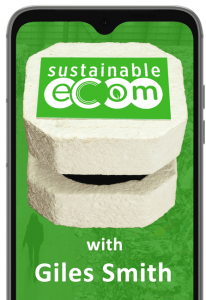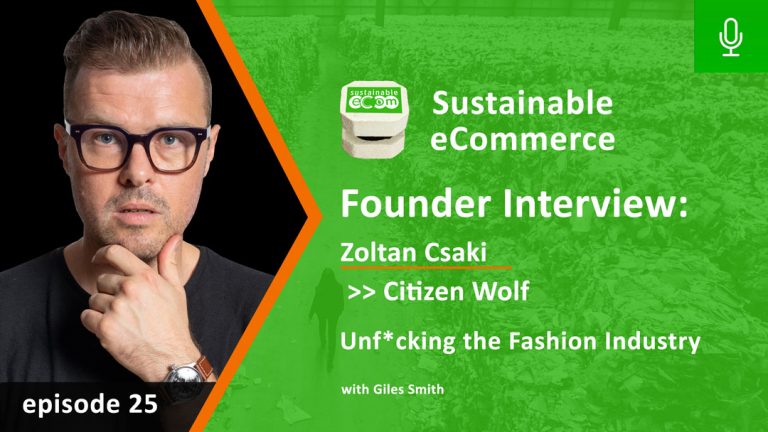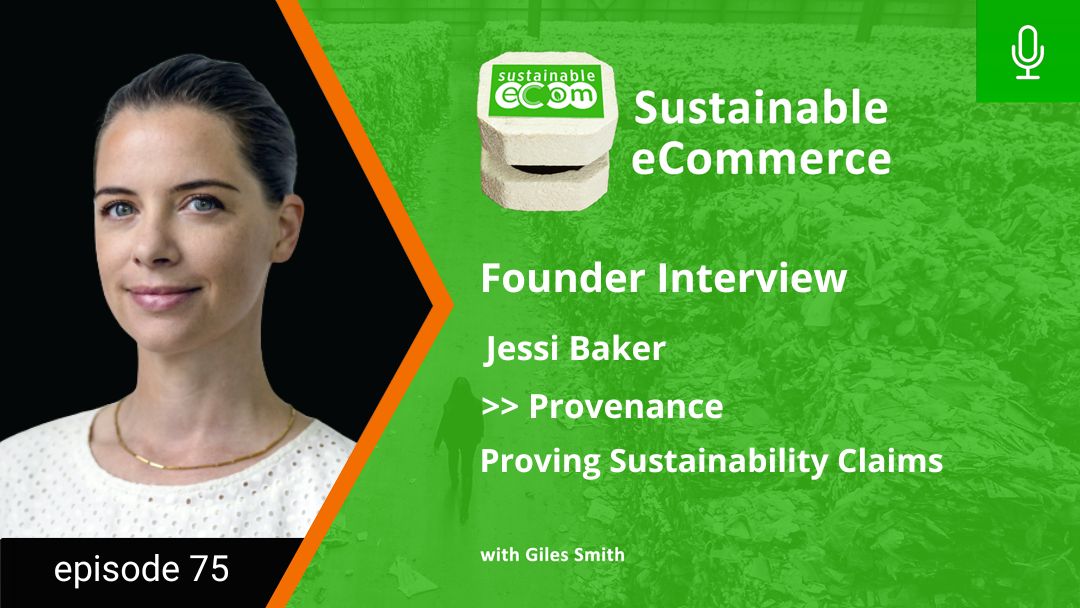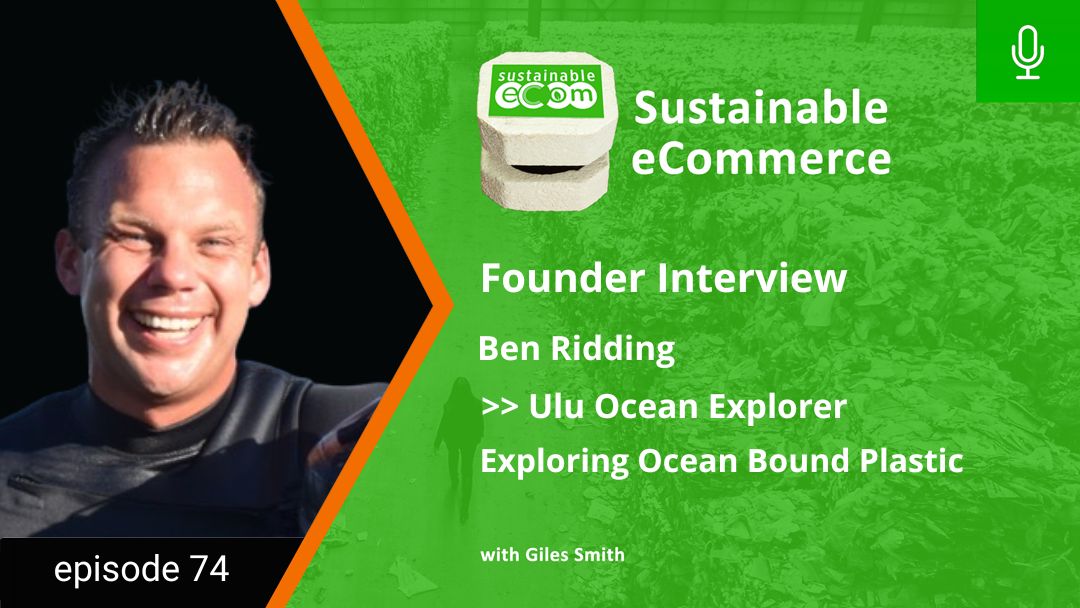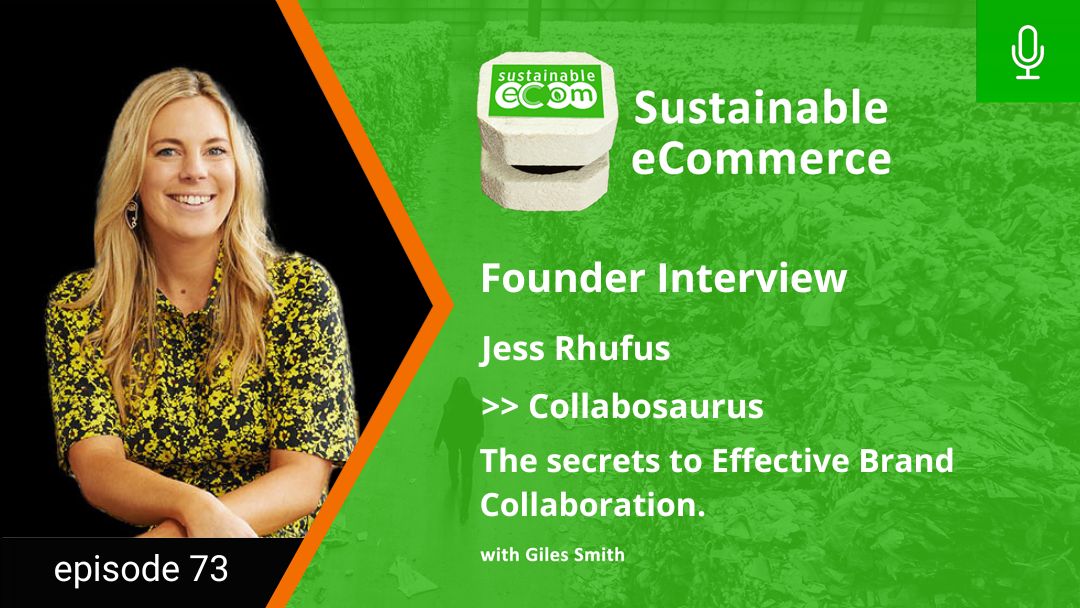Welcome to Episode 25 of the Sustainable Ecommerce Podcast!
Unless you’ve been living in a nudist colony for the past decade, I’m sure you’ll be aware that the fashion industry has a particularly bad rap when it comes to sustainability.
With fast fashion, rampant over production, synthetics and a whole host of other systemic issues that are literally baked into the supply chain. In fact, the fashion industry collectively is know as having the second highest carbon footprint, behind Oil & Gas.
But of course, there are brands out there trying to change all that, and my guest today is an absolute champion for the cause.
Zoltan Csaki is Co Founder of Sydney Based fashion brand Citizen Wolf, and their mission, literally stated, is to “Unf*ck the fashion industry”.
As you’ll see they’ve recognised that overproduction is one of the biggest problems with the industry as a whole, and over the past few years have been building out a new model for the industry based on a new take of made-to-order. But with organic fabrics, carbon positive production, free repairs for life and now a fully circular product lifecycle, they are literally setting the new standard for sustainability in fashion.
In my opinion, all of this makes them one of the most ground-breaking brands of the last decade, and it was an absolute thrill to chat with Zoltan.
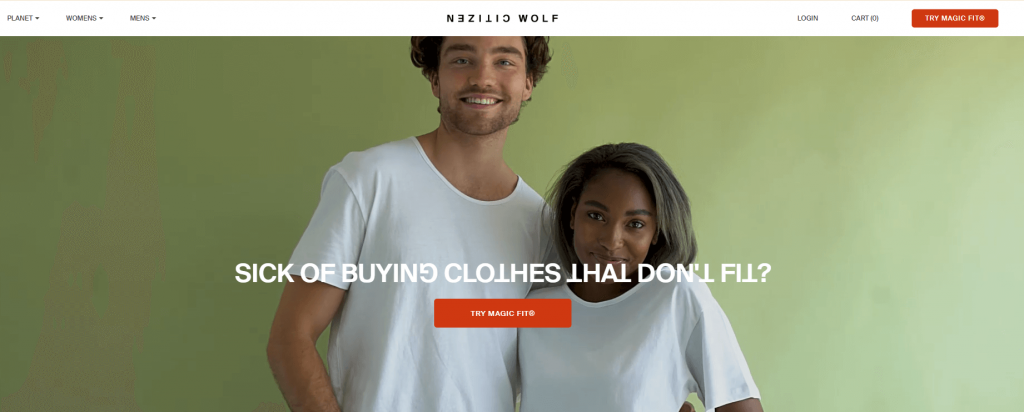
Giles Smith: Zoltan Csaki, welcome to the show!
Zoltan Csaki: Thank you, Giles. Thanks for having me lovely to be here!
Giles Smith: Tell us about your story, why did you start Citizen Wolf?
Zoltan Csaki: I’m one of the co-founders here at Citizen Wolf. We're a Sydney based fashion technology startup, and we sit really at the intersection of fashion sustainability and technology. Our mission is to re-engineer the way clothes are made at scale to save our planet. And the reason I guess that we exist is to validate beyond a shadow of a doubt, a new system for the fashion industry, because our belief is quite simply that we cannot solve climate change without changing the way fashion exists.
The fashion industry is an incredibly large part of the climate problem. You probably know, everybody might have heard this, but it's the second most polluting, industry in the world after oil and gas. It's got incredible scale all around the world. And as a result, it is responsible for quite a lot of bad in the world.
And quite simply, that's down to the fact that a lot of the industry is based on guessing, like trillions of dollars of purchasing decisions every year are based on guesses. And the reality is nobody can predict the future. And it's high time that we moved away from guessing as the bedrock of making production decision.
So the fashion industry is defined by overproduction. Again, you might have heard this stat, but bears repeating because it's so frightening in that one in three pieces of clothing made every year goes to landfill unsold.
It's incredible. When you think about it and you know, somewhere in the region of a hundred billion garments are made every year, roughly 30 billion garments end in landfill. Think about all the input costs. Think about the water used in the production of cotton, the oil for the polyester, the labour and the freight and the lights in the shops and all the rest of it.
You think about all those input costs, just to plough it straight back into the ground. It's just disgusting. So, mass production and overproduction, two sides, of the same coin is really the sacred cow of the industry. And so here, we have taken it ourselves to validate an entirely new way of working, which is made to order at scale.
And we layer on custom fit through some technology that we built called MagicFit really is a Trojan horse for the customer to get exactly what they want in terms of it’s guaranteed to fit their body.
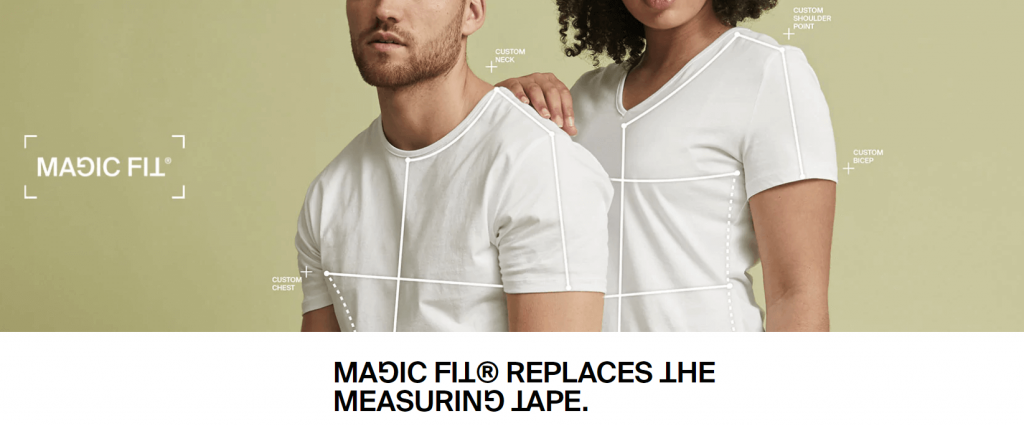
Giles Smith: In terms of fixing the fashion industry as your mission, is it simply the overproduction you were just talking about or does it go broader than that?
Zoltan Csaki: It starts with overproduction and probably ends there with us too, but you know, fashion is an incredibly destructive industry all around.
You don't have to try very hard to find innumerable examples of slavery within the fashion supply chain. So there's an incredibly large ethics issue, which got a lot of air through the nineties and 2000’s, you know, with Nike and all the rest of it. And it's kind of dropped out to a degree and been replaced with sustainability.
And I think many people, consumers, as well as people perhaps in the industry do end up conflating, ethics and sustainability. I understand why, I don't think it's correct, but I actually understand why. I also don't think it's feasible to say, well, we're an ethical brand that we don't give a shit about the planet, or we care deeply about the planet, but we're gonna screw the workers.
So I really do think that ethics and sustainability are two sides of the same coin. And I don't think you can have one without the other.
I think the biggest problem in fashion is over production and it's a systems issue. The default is mass product. But the default is waste as well. Because as I said, even the best laid plans will never correlate to the reality of the market. And so what we do at Citizen Wolf is by contrast radically simple when you think about it. And that is simply we ask people what they want. And then we go and make it for them.
Of course, being able to do that at scale on timelines that compete with traditional eCommerce, that's, that's the trick. And that's our business.
Giles Smith: Do you want just talk about, about magic fit quickly?
Zoltan Csaki: So when we started six years ago we thought it was crazy that the clothes we wear most often are usually the ones that fit us least well. People get tailored clothing for special occasions, maybe a suit for work. So we began by thinking, what if we could bring the benefits of tailored clothing to the everyday?
We had to create that technology cause all the disparate parts existed in different form. But it hadn't been knitted together. Now, all I need to create a custom fit garment is your height, weight, age. And for women we ask for bra and from those three or four data points, we can create a 3d estimate of your body that's about 96% accurate. So, we spent the first two years of citizen Wolf life building a data set manually here in Sydney. We hand measured about 2000 people and I hand cut 2000 custom fit T-shirts.
We married this custom data set that we created with much larger biometric data set that existed to create a statistical model. Now it's distilled from about 6 million data points. Everyone generally thinks it won’t work, the belief being we’re all unique, but the reality is that there's been a lot of scientific research on the human body over many years and how people age and how weight gets distributed. All of this is very well understood by science. It's just never been applied to the fashion industry.
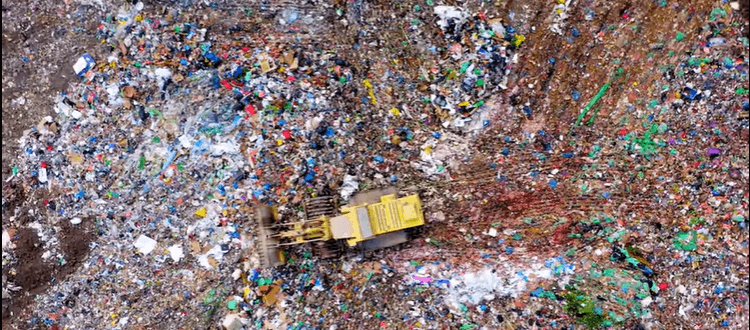
Giles Smith: I know you guys don't stop there and I want get to circularity in your business model in a moment.
But before I do, I want to take a step back to something you said earlier, about 30 billion garments a year that end up simply unsold in landfill. Why is it that so many of those just end up in landfill and they don't go to some sort of recycling centre?
Zoltan Csaki: It's a very complex answer. I think there are different reasons, probably for different brands, but certainly cost is one of them. And, you know, this idea of circularity is quite a new. We're really at the beginning of that journey of trying to understand and rewire how the world works so that it is more circular and it is less destructive on the whole.
Giles Smith: Obviously you've got your eye on the whole supply chain. Do you see service providers cropping up that are dedicated to doing that more now to try and solve that problem upstream and provide a more economical source for recycled garment recycled material?
Zoltan Csaki: Yeah. So the flip side of the answer to the previous question was that there isn't really also yet any scaled solution for composite fibres. So a lot of the stuff that we wear, not from Wolf, cause we only use natural fibres, but a lot of the stuff you might from other brands are blended, and its not possible to recycle that yet. It's going to come online eventually, but it isn't there yet.
So straight up, we just don't have a good recycling solution for a huge amount of the garments that get put into the world. In terms of natural fibres only, there are recycling systems that have existed for a long time. In fact we have a take back program now which we just launched recently, where we'll take back anything that we've put into the world and combine it with our pre-consumer waste from the laser cutter. But, we have to send that to Spain. Sadly, there's no solution in Australia,
We send it to Spain and then they basically create a 50% recycled fibre spun around a core of organic cotton, for strength. When you recycle fibre, you rag it down via mechanical disassembly. It shortens the fibre length and therefore it makes it less robust, less durable.
And we knit it in Melbourne we're very pro the local supply chain. So we knit it into a new t-shirt or Jersey. So right now we are very proudly, 100% circular.
We also fix it if it breaks because we do free repairs for life. It's a terrible business decision, but it's the right thing for the planet and its best for the customer. We're also unique in the sense that we've only ever put natural fibre into the world so I can take it back knowing full well that it can be recycled.
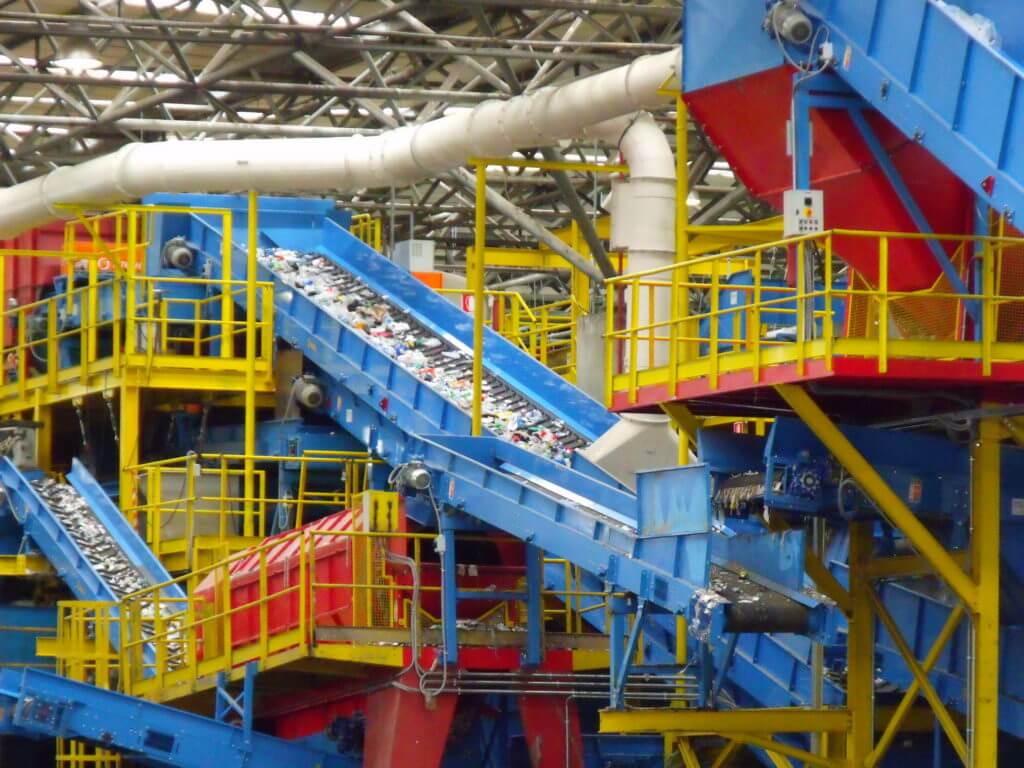
Giles Smith: I think it's time for a quick change of pace, tell us a little bit about what the journey’s looked like, some of the highs, lows, and biggest lessons that you've taken out of building the business.
Zoltan Csaki: We've been creating something that hadn't really existed before and that's inherently difficult. Funding is incredibly difficult, but important. You know, innovation costs money!
Giles Smith: One of the things I thought was interesting was that Eric, one of your co-founders said that you've grown without any ad spend or at least not, not an appreciable amount of ad spend. What has been your main source of attracting new customers?
Zoltan Csaki: So let me qualify that we grew 30% last year without any more ad spend. We do spend on ads. We do performance marketing. We're not really big enough to do anything else. We don't do billboards and that kind of stuff. That was a learning experience. We outsourced it at the start and then ended up bringing it all in, because it just stopped working. And I really think as a direct to consumer brand as well, you know, being able to acquire customers is by definition the core competency of the business.
So we went on an incredibly steep learning journey internally to get across performance marketing, not to say that we're very good at it. Certainly not excellent at it, but we are good enough.
I would say Citizen Wolf more generally has the approach of “how difficult can it be?” That's my bumper sticker. My approach is “yeah, we can do that.”
“Yeah, we can write the tech”, “Yeah, we can become performance marketers”. But there’s only so many hours in the day, which is the balance. It's very hard to do everything well, and I don't think we do. I think we do a lot of things well enough, but not great.
Giles Smith: Yeah for most people I would advise doing the things you’re great at and outsourcing the rest, so you’ve brought an interesting challenge on board to bring all that inhouse. Have you developed out an entire team as a marketing competency?
Zoltan Csaki: We're 12 people full time now, nine of those are in the factory. So everything else that Wolf does is really the result of just the three of us Co-founders. That's everything from the emails to the website, to the fundraising to the performance marketing.
Giles Smith: When do you sleep?
Zoltan Csaki: We're getting much better at that! We were seven days a week for the first few years.
Giles Smith: What's next? You guys have just had a tremendous equity crowd raising round. What are you going to use that for and what's on the horizon for the next couple of years for Citizen Wolf.
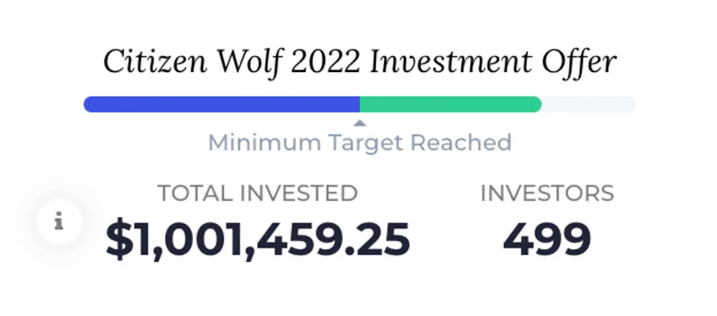
Zoltan Csaki: We just, just closed on Birchal a few weeks ago, we raised 1 million dollars, which is amazing. And we were very clear with what we said we would do with that money, and that's three things. First of all, make more product. Because up until very recently, we really only had one product, which was the magic fit t-shirt. At the start of this year, we launched polos for men and then later for women.
And then just in winter, a couple of months ago we launched sweats for the first time, all based on the same magic fit inputs. And so the first thing we want to do with the money from Birchal is scale out. And make more of the things that our customers are already asking us to buy.
I'm on record in many places saying our, our North Star is denim jeans? Custom fit jeans based on just your magic fit. I consider that to be a game changer. And that's where we’re ultimately aiming with Citizen Wolf as a brand.
So that's number one. Number two is we need to scale out the factory to keep up with making all of those products. Because unlike other fashion brands where you're like, oh, let's go and make a jacket, let's find a factory that's good at making jackets, we can't do that. So, for us to make a jacket, it means we have to get across learning how to make a jacket. Do we need to find new seamstresses that have that capability? How can we make it?
And then the third thing we're doing with the money is starting to sell internationally. Because the people that buy our product here at Citizen Wolf exist all around the world. We call them the impact shopper. They're the people that basically vote with their wallets for the world.
So once the marketing's working in a new geography, then our ambition is to clone the factory that we've built here and build a second one in that place, because it's always been important to us to use local labour with local fabrics for that local market. And so our grand plan for Citizen Wolf is to have a series of micro factories, around one in each geography.
And then finally the long term opportunity is and always has been starting to license the technology that we've built and allowing other people in the industry to move to a made-to-order model because no matter how big Citizen Wolf grows, fashion is one of the most fragmented businesses in the world. So even the hugest largest fashion brands in the world, there's not a single one that accounts for more than 2 percent of the global fashion business.
There are brands that wat to move this way. You know, the environmental benefits of made-to-order are indisputable. The customer benefits of custom fit are indisputable. And what we're proving with Citizen Wolf is that the business metrics are also fundamentally better than the rest of the industry and indisputable. Our repeat purchase is three and a half times better than the e-com average in Australia for fashion.
And our return rate is four times lower. And so, what we believe we've built is not only a better product, but fundamentally a better business.
Giles Smith: Just a couple of things to do then! Very, very smart plan. Expand out your product range, expand out your geographies and then license the tech, just to expand out your impact.
Thank you so much, Zoltan for your very generous time today.
Zoltan Csaki: Thank you Giles. Thank you very much. It's been an honour to be here and I appreciate your time
Top 3 Takeouts
- I think one of the most refreshing perspectives, especially in someone trying to re-invent an industry is the approach of saying ‘how hard can it be’? Now maybe it takes an industry outsider to think like that, and certainly Zoltan, Raul and Eric are not native to the fashion industry.
The philosophy of ‘how hard can it be’ led them to in-house their Facebook marketing, and that’s my second take out. Now, usually my answer for ‘how hard can it be’ when it comes to building and scaling Facebook campaigns is ‘very f*cking hard’, and I would frankly almost always recommend outsourcing it.
That being said, Zoltan’s point about customer acquisition being a core competency of an online retail brand is fairly made, and their funnel is working for them because rather than being focused on setting the world alight with their ad campaigns, their focus is where it needs to be, on delighting and retaining customers, and encouraging repeat purchasing through their email channel.
My last take out is just the simple, smart and logical growth plan they’ve laid out. While the technology they are building and their objectives for redefining and industry do seem like rocket science, the best laid growth plans are usually conceptually simple. Scale out their range of garments to more broadly service existing customers. Duplicate their model to new geographies, and then finally multiply their impact by licensing the model to other fashion brands.
I don’t doubt for a moment that having such a succinct & clear plan was one of the reasons for their recent equity raise success, and worth thinking about if you want to follow in a similar path in raising capital.
Now I’m actually going to add a fourth take out, something that Zoltan just touched on but we just didn’t have the time to dig into. He mentioned that for him, custom fit jeans were Citizen Wolf’s North Star. The ultimate accomplishment in the world of made to order and custom fit casual wear.
I love the notion of having a North Star for you business, something to navigate towards, to help you really set the benchmark of a new standard in sustainability, no matter what your vertical is. So I’ll leave you today with a challenge. What could be your brand’s North Star, and what would you need to do in your business to achieve it?
But the key point is that taking an ‘yeah we can do that’ approach opens the doors to new ways of thinking, new techniques, new strategies and potentially even the development of new in-house capabilities.
So I hope you enjoyed today’s chat with Zoltan. I’ll be back with you again next week with another inspiring founder interview from the world of sustainable ecommerce, so until then, keep building your brand for a healthier planet!





